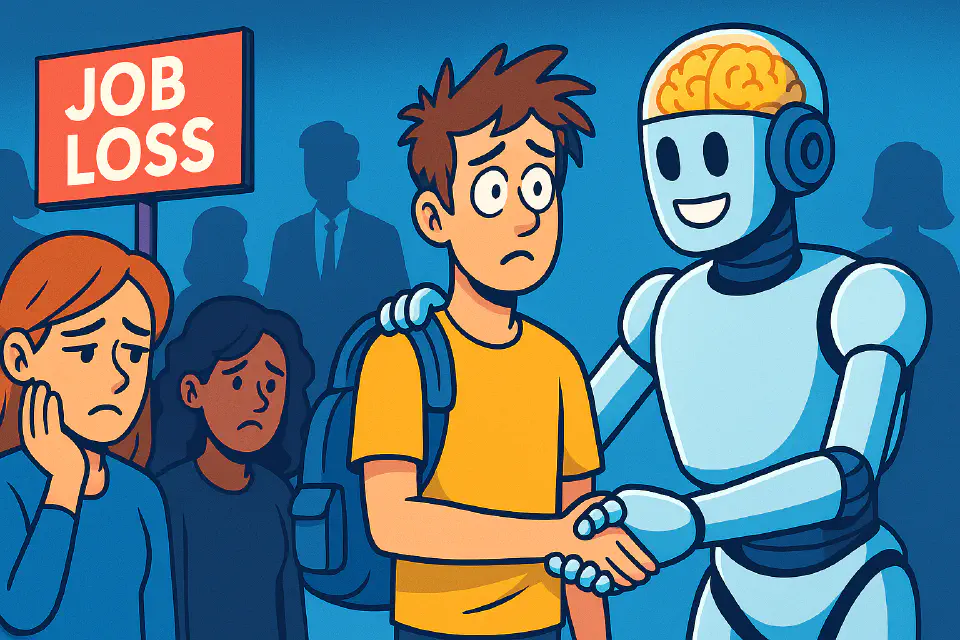
How AI Is Reshaping Entry-Level Careers: The Uneven Impact on Young Workers
New research from Stanford reveals a troubling trend: AI isn't just changing work—it's sidelining the youngest workers first.
AI Is Reshaping the Labor Market—But Not Equally
Since late 2022, generative artificial intelligence (AI) has gone from curiosity to career disruptor. With tools like ChatGPT becoming mainstream, new research from Stanford University reveals what many young professionals have feared: AI is already eating away at their job opportunities.
The study, based on anonymized payroll data from ADP covering millions of U.S. workers, shows a clear pattern. In AI-exposed occupations, especially software engineering and customer service, employment for 22- to 25-year-olds has plummeted by 13% since the end of 2022. Meanwhile, older and more experienced workers have been largely unaffected—some have even benefited.
The “AIxiety Pivot”: Young Professionals Are Already Recalculating
The impact of AI is no longer theoretical. While senior executives debate its potential, entry-level professionals are already pivoting. Career site Zety calls this shift the “AIxiety Pivot”—a wave of young workers fleeing white-collar tech roles for hands-on jobs that feel safer from automation.
Some early-career workers are turning to skilled trades, warehousing, and even hospitality. Blue-collar work may feel more stable and less replaceable than jobs that involve sitting in front of a computer all day.
But this transition isn’t embraced by all. According to a recent Harris Poll:
- Only 33% of Gen Z workers strongly agree that skilled trades offer a quicker, more affordable path to career stability.
- Roughly 50% of older generations see trades as a smart alternative.
Why Are Entry-Level Jobs the First to Go?
Stanford researchers suggest that AI’s automation power targets codified knowledge – the kind typically taught in schools and entry-level roles.
- Book smarts (codified knowledge): Easily mimicked by LLMs like ChatGPT.
- Street smarts (tacit knowledge): Gained through years of experience, far harder to replicate.
That means junior workers who haven’t yet developed deep experience are most at risk. While seasoned professionals bring unique value through intuition, pattern recognition, and strategic judgment, younger employees often rely on skills now easily handled by AI.
Not All Jobs Are Equally at Risk
The report underscores a key distinction: AI is more likely to automate than to augment in certain roles. When AI augments work, it becomes a powerful partner. When it automates, it makes human workers redundant.
Roles with repetitive tasks, script-based interactions, or predictable outputs are prime targets. That includes many entry-level positions like:
- Call center agents
- Frontline tech support
- Junior software developers
But roles requiring collaboration, empathy, adaptability, and unstructured problem-solving remain harder to automate.
Experience Is the New Armor
Older workers appear shielded from AI disruption—at least for now. Why?
- Tacit knowledge built over years
- More strategic, less routine work
- Broader networks and reputational capital
That experience acts like a kind of “anti-AI armor,” making seasoned professionals more adaptable, more trusted, and less replaceable.
For younger professionals, the path forward requires upskilling beyond the obvious. It means mastering what AI can’t do:
- Building relationships
- Leading teams
- Navigating ambiguity
- Innovating across silos
What Should Employers Do?
The findings are a wake-up call for employers hoping to attract and retain next-gen talent. Here’s how to act on them:
- Audit your early-career pipelines: Are you hiring for roles that AI will soon replace?
- Invest in hybrid learning pathways: Pair technical upskilling with scenario-based problem-solving.
- Rethink onboarding and mentorship: Accelerate the acquisition of tacit knowledge.
- Talk openly about AI: Don’t let fear fill the silence. Make AI part of the conversation, not the elephant in the room.
The Bottom Line
AI is not the future of work. It’s the present. And it’s already reshaping the job market for the youngest professionals. As automation accelerates, companies that want to nurture talent—not lose it—must redesign how they think about entry-level jobs.
We’re not just automating tasks. We’re rebalancing opportunity.
And unless we act fast, the generation just entering the workforce might be the first to feel left out.